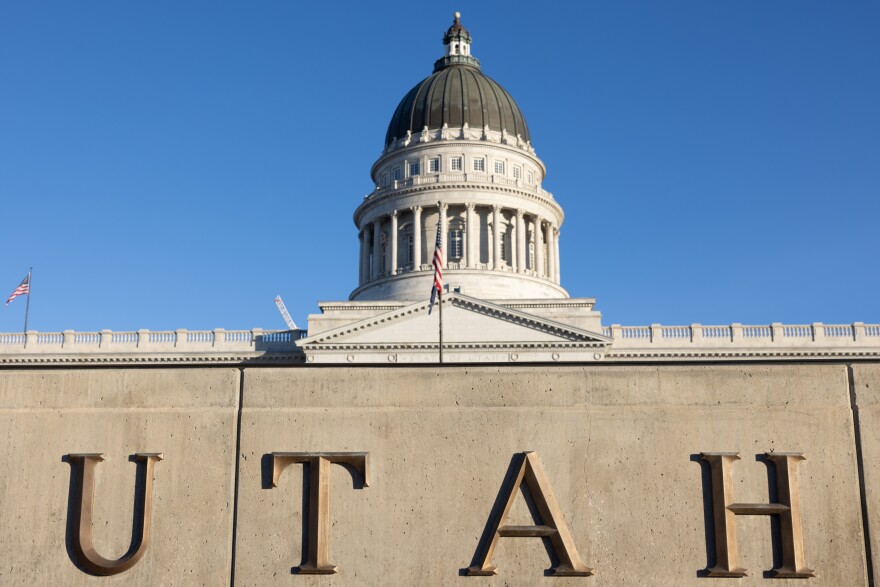Legally requiring a religious leader, like a Latter-day Saint bishop or Catholic priest, to report child abuse has failed to pass the Utah Legislature in two recent attempts. This time around, Republican Rep. Anthony Loubet hopes his bill addressing the problem makes it all the way to Gov. Spencer Cox’s desk.
Loubet’s approach doesn’t mandate ecclesiastical leaders to report abuse. Instead, it would give them the option to, even if a person “has made a confession to the clergy member” about perpetrating such abuse. They can also make a report if they have a “reason to believe that a child is, or has been, the subject of abuse or neglect,” even if it hasn’t been disclosed to them.
If a bishop, for example, reports abuse to local authorities, they would be granted legal protections if an investigation is launched. The bill’s language states it has to be “ongoing abuse” that’s happening in real time. It would not apply to abusive actions committed before passage of the bill, unless it continues once and if the bill becomes law.
“It's more of a carrot approach where we're trying to say, ‘Hey, we open up the door so you're able to report it in this circumstance. And if you do, you get the liability protections,’” Loubet told KUER in an exclusive interview in advance of filing HB432, otherwise known as “Child Abuse And Neglect Reporting Amendments,” in the Legislature.
According to Loubet, a “balance” is being struck between giving religious leaders the option to report abuse and upholding their duty to confidentiality. Clergy would have “legal liability protections” for relaying the abuse, meaning they wouldn’t be “civilly or criminally liable for not making a permissive report” right away nor would they “waive any privilege under the Utah Rules of Evidence by making a report.” In other words, clergy would also not be required to stand trial or act as a witness in the case unless the defendant consents to it.
“If you report, you don't have to worry about being civilly or criminally liable because you're doing your job,” Loubet added. “If a member of the clergy decides that they want to report, you can't have somebody coming back later and suing them for doing that.”
The Catholic Diocese of Salt Lake City, which has vehemently opposed similar bills in the past, said in a statement that they “do not oppose” the bill “as it is currently written.” However, they added that could change if the language of the bill does and requires priests to report abuse they learned during confession.
“If this requirement were to become law, Catholic priests would face the untenable choice of breaking the law or being excommunicated, because breaking the Seal of Confession means automatic excommunication for a Catholic priest. This would seem to be a blatant violation of the First Amendment,” the Diocese said.
Through a spokesperson, The Church of Jesus Christ of Latter-day Saints, another institution that has been wary of related legislation, told KUER they “will not oppose the bill.” In November, a high-profile child sex abuse lawsuit in Arizona against the LDS Church was dismissed based on the clergy-penitent privilege in the state’s mandatory reporting law.
Democratic Rep. Brian King, who is also running for governor, has submitted nearly identical legislation to Loubet’s this session. The biggest difference is, under King’s bill, the abuse wouldn’t need to be “ongoing” in the present to be reported. It has not made it out of the House Rules Committee.
Minority Leader, Rep. Angela Romero, who is Catholic, has sponsored legislation in 2020 and 2023 that would accomplish a comparable goal. Both bills failed to make it out of the House.
The Utah Democrat believes clergy should be held to the same standards as counselors and teachers.
“I think religious leaders need to be mandatory reporters because I think it's in the best interest of our community,” Romero said.
While she’s supportive of anything that’s “a step in the right direction,” she doesn’t think both bills go far enough.
“It's really important to hold anyone accountable if they've sexually abused a child,” she said. “If somebody is … continuously hurting children, they need to be in jail. Confession can only do so much.”






